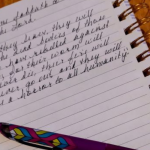The following are the notes I’m taking to Ladies’ Bible Class tonight.
Listen, my son, to your father’s instruction and do not forsake your mother’s teaching. Proverbs 1:8
We often hear the phrase: What Would Jesus do? That’s a reasonable question to ask. We should always want to act in a given situation the way our Lord and Savior would act.
 Tonight I want to ask the question, “What Would Mother Do?” If you think about it, our mother is our first teacher. In our younger years, and even as we grow older, she can be the most influential person in our lives. There is probably not a major (or not so major) event that happens in our lives without us wanting to give mom a call or at least ask ourselves if mother would approve. Those of us blessed with strong mothers that strive to put God first in their lives have been truly blessed. Those of us who haven’t, have learned to find other women of influence to fill the void.
Tonight I want to ask the question, “What Would Mother Do?” If you think about it, our mother is our first teacher. In our younger years, and even as we grow older, she can be the most influential person in our lives. There is probably not a major (or not so major) event that happens in our lives without us wanting to give mom a call or at least ask ourselves if mother would approve. Those of us blessed with strong mothers that strive to put God first in their lives have been truly blessed. Those of us who haven’t, have learned to find other women of influence to fill the void.
But tonight’s lesson is not about our mothers — it is about us as mothers. What kind of influence are we passing on to our children. What will be the answer when our children ask, “What would mother do?” It’s an awesome thought to ponder — especially when you consider that we still ask ourselves what our mothers would do and they may have died years ago. Our influence we have on our children will last, not only for the here and now, but for years to come.
So, you say you’re not a mother. You can’t get off the hook that easy. Paul told Timothy in 1 Tim 5:
“exhort the older women as mothers”.
Jesus said in Mark 10:29-30:
“Assuredly, I say to you, there is no one who has left house or brothers or sisters or father or mother or wife or children or lands, for My sake and the gospel’s, 30 who shall not receive a hundredfold now in this time—houses and brothers and sisters and mothers and children and lands, with persecutions—and in the age to come, eternal life.”
Not only will you receive these mothers if you give up a mother for Jesus’ sake, but you have the responsibility to be a mother to those that have given up their family as well. Either way you look at it, you have and are a mother when it comes to your brothers and sisters in Christ.
Let’s take a brief look at some notable mothers that God has chosen to share with us.
- Eve — the very first mother. Imagine what that was like. She didn’t have the experience of her mother to tell her what to do. She hadn’t even gone through the growing up process herself. Imagine facing the teenage years without ever having been one or ever having watched someone deal with teenagers.
- Sarah — Not much is said about her mothering experience but the fact that she waited so long and had a child in her old age is mind boggling to most of us. It is said that Isaac loved his mother and no one really saw a need for him to take a wife until after Sarah had died. That shows what a powerful bond Isaac and Sarah had.
- Rebekah — the mother of Jacob and Esau. Think about the influence she had on her boys. She favored Jacob (already not a good thing) and then she encouraged Jacob to lie to his father about who he was. Mothers can be an influence for evil as well as good.
- Hannah — here’s a woman that not only desired a child but knew what she needed to do to get one. Through her faith in God she received the child she wanted and then was willing to give him up to God’s service.
- Eunice and Lois — a mother and grandmother that are praised by Paul for teaching Timothy (even though his father was not a Jew) all about God. I would hope that the same could someday be said of me. Not only was his mother Eunice a big influence in Timothy’s life but his grand mother Lois was as well.
- Mary — the mother of Jesus. She had a great influence on Him, although I don’t believe it was quite as strong as some movies and religious groups would have us believe. The wedding feast in Cana comes to my mind. Jesus had told her that it wasn’t His time yet and she still told the people around to do what He said. What did He do? He did as His mother wished. I don’t know why, I just know He did.
I know we’ve heard lessons about influence all our lives. They are all good lessons but sometimes they don’t get down to the nitty gritty of what influence means to me — a mother. I’d like to talk a little more intimately about our influence over our children.
Years ago, when I began home schooling, I read something I’ll never forget: If you want your child to read, let him see you reading. Read anything — magazines, newspapers, novel, but especially read the Bible. Let them know that you truly value the Bible and they will too. If you only read it at night before you go to bed, they won’t really see you reading it. This rule of thumb has stuck with me through the years and I have seen it not only hold true for reading but for everything else I do.
When we lived in Lubbock, I played the piano every night after the kids went to bed — it was the only way Timothy would go to sleep. I would play something that I thought Matthew might find interesting to try. After I played it, I would leave the music on the piano so he would be sure to find it. Sure enough, some time during the next day, he would sit down and learn the same piece. He played it because he heard me play it. At the time, that’s all the piano lessons he got. It was a powerful teaching tool.
Whatever your children see you do — and enjoy — that’s what they’re going to do. If they see you enjoy fishing, they’re most likely going to enjoy it as well. If they see you enjoy jogging, they’ll most likely enjoy jogging. It’s natural for children to want to be like their parents and to do what their parents do.
That’s true whether the parent is doing something good or not. Remember the commercial of the kid that copied everything his dad did — even to the point of grabbing a cigarette when his dad did. Every time that dad took a cigarette and put it in his mouth, he was telling his little boy that this is something dads do and you can do it too.
Let’s talk about some specifics:
Prayer — Do your children see you pray? At meals? How about when something good happens? Or something bad? Or your heading out on a trip? Or your just want to talk to God? Do you children see this?
Helping Others — I know we all help others when we can. Do our children see this? Those that have children in public school may not realize how much of the helping others they do while they’re kids are in school. We should not help others just so our kids can see us but we need to make sure they do so they’ll learn how important it is to us and to God. Teaching them to get involved is a great way to get them started on a life of helping others.
Think about this: The family is sitting in the pew on Sunday morning and the announcements are being made. There are several things mentioned — sick people that need tending too, travelers that need prayers, classes that need taught, classes that need attending. What do our children see us do after hearing the announcement? Do we follow up on these announcements? Do phone calls get made, food prepared, prayers sent up? How about volunteering to teach that class or attending a class that we may not have previously attended? As we sit and do nothing about the announcements that are being made, our children are learning to do the same.
Okay, now I’m going to get personal: Every week, there is an announcement about a singing class. Every week, all the children hear the announcement. Every week, the same few people attend this class. What have the children learned? It’s okay to not participate in something the congregation is doing. It’s okay to not want to improve our singing. It’s okay to offer our second best to God. I pick on the singing class because, for the most part, this congregation is good about all the rest of the stuff that gets ann0unced. It’s something to think about though. Whether it ‘s a singing class, a ladies’ Bible class, a teen devotional, or any opportunity to gather with our brothers and sisters in Christ, what are our children learning from our response?
When they get older, and they start making their own decisions, they’ll be used to the idea that just because something is announced doesn’t mean it affects me. I really don’t want to attend a gospel meeting that my congregation is planning. That’s okay. It’s just not for me. I’ll leave that to people that like to sit and listen. I’ve got other things to do.
What about the sermon? Or a Bible class. Wherever the Bible is being taught. What happens on the way home in the car or at the dinner table if error was taught that day? What’s our reaction? The way we handle a situation like this will be a strong influence on how our children handle the same situations when they’re grown. Do we ignore it and hope the problem will go away (or that it won’t be brought up again)? Do we get angry and talk hatefully about the teacher? Do we decide we’re just not going to worship there anymore? Do we study together and show our children what God thinks about the matter? What will our children learn from us?
What if we’re listening to a sermon (or Bible class) and someone steps on our toes? Something is taught as sin that our family actively or not so actively participates in? What do we do then? What do our children hear from us on the way home in the car? at the dinner table? Excuses for our behavior? We often call these excuses reasons but they aren’t. If we’re disobeying God, we’re making excuses when we try to defend ourselves. Do we continue on in our error as if nothing was said? Do we make fun of the teacher and try to belittle him/her in the eyes of our children? Or do we study together and learn more fully what the Bible says with a willingness to change our ways? What will our children learn from us?
What if the subject is salvation and we face the reality that we were never really saved to begin with? Do we go on as if everything is okay? I’ve seen it happen. People think someone has obeyed God 100% but he hasn’t. He has let people believe what they want to believe. What have our children learned from us?
What if the subject is modesty — or lack thereof? Do we continue to dress in an immodest manner? Do we continue to buy clothing for our children (or ourselves) that are inappropriate? Every time we wash an immodest outfit and put it back in our child’s closet, we are saying, “I approve of this outfit and want you to wear it.” Every time we buy something that we really wish our child wouldn’t ask for but figure it won’t hurt this once. Every time we do it, we’re saying, “I approve of this and want you to wear it.” What have we taught our children?
What about dancing? When we hear someone speak about the lasciviousness and immodesty of dancing, what do we do when we go home? Hope our children didn’t hear? When we send our little girls to dancing class as pre-schoolers, we’re teaching them that this is something I want you to be good at. We may say it’s for their poise and balance but that’s not the message the little girl is getting. Every time we give in to a party that may have dancing available, even if we instruct our child not to dance there, we are telling our child that it’s okay to be around others that are sinning as long as you don’t participate. Once we’ve trained our children to think dancing is okay and once they have out grown the school dances, where will they go for this fun they’ve enjoyed over the past few years? They’ll be going places that Christians ought not to be. What have we taught our children?
What if the sermon is on priorities and we have the car packed ready to head out to the ball park or a camping trip as soon as the last amen is said? Or what if the children weren’t even there to hear that sermon because they were on a scouting trip or at a tournament? What have we taught the children? Where will their minds be during that worship service — if they were there? Maybe instead of heading out to the event, you were late coming (early hours of the morning) home the night before? What priority was set for worshiping God? We’ll squeeze him in in between all the other activities we have going on?
This last one is difficult for all of us. We are all busy, but the way that we handle situations — prioritizing things that are most important and even missing out on events that are not all that important — will teach our children wonders. It’s hard at times to determine the best thing to do. We can’t and shouldn’t just “no” to every activity that comes along. We can teach our children to put these activities into perspective. If we raise a super athlete, that’s what we’ve got. If we raise an eagle scout, that’s what we’ve got. If we raise a Christian, that’s we’ve got. Can a Christian be an athlete, an eagle scout, etc (notice the emphasis on boy activities — sorry that’s my experience)? Of course, but the most important lesson is how important God is.
The Scouts will try to encourage your boys to go to camp outs with the understanding that they will have a short chapel service on Sunday morning. I don’t know how many times I’ve tried to explain to a scout leader that we’re not wanting our children to go through the prayers and Bible readings so they can get on with the fun stuff. We’re wanting them to learn to put God first and to make the family of God a priority in their lives. I’ve gotten some crazy looks before.
I’ve had the same problems with music. I have had to turn down play opportunities (these are paying gigs) because it would interfere with assembling with brothers and sisters in Christ. I have had some people that were willing to bend a little for me but for the most part, in the music world, there isn’t much bending going on. When I told Timothy’s cello teacher that we couldn’t go to a concert he wanted us to attend because we would be at Sunday evening worship services he was very surprised. We went twice on Sunday? He had never heard of such a thing.
I have to teach my children the appropriate places to play and the appropriate music to perform. It is a constant battle. It’s not easy for a child to have to walk away from a great opportunity because of his/her convictions. I know that there have been times I was overlooked for a great opportunity because of my convictions and I know it will happen to my boys as well. These are sacrifices we must make to be pleasing to God.
What others can you think of?
This is such an important aspect of being mothers. We can’t afford to mess it up. We only get one chance. What can we do to be a better influence to our children?
- Prayer — I know, this is always the answer to everything. We are given the gift of prayer and we should consider it an honor and an obligation. We have the privilege of speaking directly to our Creator. This should always be our first line of defense.
- Study — This sounds like a broken record as well. How else will we know what God wants us to do if we don’t study? We should be able to give an answer for what we do without having to go ask the preachers or go ask our husbands or go ask Google.
- Dedication — We must dedicate our lives to God — not just our Sundays. Everything we do 24/7 should be devoted to God.
- Honesty — We have to be honest with ourselves. Are we really teaching our children the right priorities? Are we really putting God first?
Children are a great gift from God. They deserve great mothers. Be the BEST!








Oh, no… did you end up delivering the lesson? I have never had that case, but I have bad rosacea, it makes my skin look terrible, but since it doesn’t inhibit me from talking, seeing or listening, it helps me work on my vanity and become very humbled and trust God that people don’t see my exterior but my interior, and gulp, that is sobering!
And I forgot to subscribe to follow up comments, so I’m sorry I came this late to see your blog. But today as I was working on a letter for the parents before we start the new curriculum Shaping Hearts for God, I just remembered you and your blog, and I got to read this now.
I totally agree with you. I couldn’t agree more. First, congratulations for your wonderful job of being a living example. I’m glad your children sought small congregations and that they stayed so strong in the Lord.
And it’s true. Many of the things I believe they are missing out are points of weakness in our own thinking. It is when you do present it as a ‘sacrifice’, something that so sadly you can’t have, or do, that they reproduce your mood and take, and act as if they are suffering for not going with the flow. If we had more conviction when we think about these matters, they will embrace it with conviction.
For us swimming is a big thing. We grew up and were able to wear swimming suits and swim everywhere and with anyone… and I have an ideal image of that, but in truth it was very detrimental to our purity and our safety. We sometimes remember something and forget all the sin associated it with it and idealize it. And I don’t realize that even when my daughters swim less, they do it in safe environments, with the right clothing, and they have so much joy about it, and they will remember it with that same joy.
And ditto, your mom’s experience with your oldest sister rings so true!
So the more careful we need to be expressing some things (our desire for them to be christians, and faithful, and God’s pleasing women), and not others (such as them being superior or excelling to be better than others, or to achieve social status, or to have worldly beauty, popularity), the same things that may tempt us and that will influence them a lot once they have to make faith their own and make their own decisions.
I was supposed to teach this lesson 2 weeks ago. About an hour before the class was to start I had an allergic reaction that hit my eyes and swelled them both shut. I looked horrible. It didn’t hurt but I couldn’t open them to see and I (even though I don’t consider myself a vain person) was not going out in public looking like that. So, I called and told the hostess of the evening that I wasn’t going to make it. Tonight, I get another chance.
Thank you Silvia. My husband and I were talking about things we feel bad about our kids missing out on. Funny thing is that those things we thought they were missing out on (because we either did them or wanted to do them as children), they don’t even want to do.
One example is the congregations they have chosen to worship with after leaving home. I have always felt a little sorry for them because we have always worshiped with smaller congregations. I figured that as soon as they left home they would seek out a larger congregation to worship with. So far, the 3 that have left have actively sought out smaller congregations. They had never felt like they were given the short end of the stick and all the time I was feeling sorry for them.
I remember when we were young, we lived in Houston right across the street from a bunch of undeveloped land and horse stables. My oldest sister always wanted a horse. Every time we drove by those stables she would talk about wanting a horse. My mom was telling one of the women at church about this and was concerned because she knew they would never be able to afford a horse for Alice. She felt sorry that Alice would be missing out. The lady told mom that Alice is only interested in things that her mom and dad are interested in. Mom realized that every time we drove by those horse stables she made some comment about the beautiful horses and how much fun it would be to ride them. Mom stopped making the comments and Alice stopped showing such a huge interest in horses. She still enjoyed looking at them and rode them when she could but she wasn’t begging for one anymore.
It’s not enough to teach our kids what is and isn’t appropriate behavior. We need to fill their lives with things that are appropriate. Think outside the box and give them activities to do that will not cause them to compromise their conviction — now or later on. They will be so busy doing things that are appropriate that they won’t even miss everything else.
This was a grounded and sobering post, Diana. I am with you in every single word you said.
I like your comparison with reading. I will surely let my girls see me more studying Bible and praying too.
And us, parents of two girls, struggle more with the modesty and dancing. My oldest daughter is very very athletic. She learns everything physical fast and by herself. She spends her free hours standing on her head, riding bike, that’s her. And I know that she will be a wonderful athlete or ballet dancer. I did ballet, my parents aren’t christians. I read books that I remember and now I look at them again and they seem vulgar to me, not the quality reads or music, or activities I want for my girls that are God’s pleasing.
And with modesty the same. Despite of them being 6 and 4, we are teaching them that swimming suits and some activities are not right, some movies either… and this is difficult for US. I tend to think they will “miss out”, when all it’s just by my doubts and shortcomings trusting the Lord fully.
Anyway, this was very encouraging. Thanks for sharing.
Love,
s